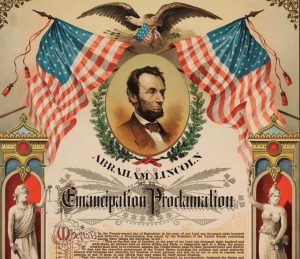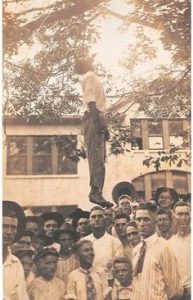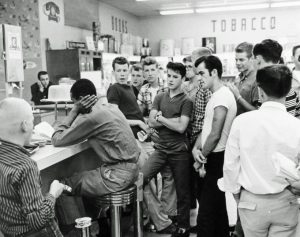Lynchings
1865. 1920. 1960. 2020.
June 10, 20201865.
June 19—“Juneteenth,” also called Emancipation Day—commemorates the day in 1865 that the Emancipation Proclamation was read to enslaved African Americans in Texas and is now honored in 47 states.
[Historian Michael Beschloss]
1920.
Postcard depicting the lynching of LIGE DANIELS, Center, Texas. August 3, 1920. The back reads, “This was made in the court yard in Center, Texas. He is a 16 year old Black boy.
1960.
Protester harassed during sit-in at segregated drugstore lunch counter, Arlington, Virginia, 1960.
[Historian Michael Beschloss]
2020.
This still image taken from a May 25, 2020, video courtesy of Darnella Frazier via Facebook, shows a Minneapolis, Minnesota, police officer arresting, and suffocating, George Floyd.
[DARNELLA FRAZIER/FACEBOOK/DARNELLA FRAZIER/AFP VIA GETTY IMAGES]
‘Collective anger, anguish, and grief.’
-Trymaine Lee
@trymainelee
‘The Politics of Death’
November 11, 2019V E T E R A N S D A Y
Thomas Merton:
In moments that appear to be lucid, I tell myself that in times like these there has to be something for which one is willing to get shot, and for which, in all probability, one is actually going to get shot. What is this? A principle? Faith? Virtue? God? The question is not easy to answer, and maybe it has not answer that can be put into words. Perhaps this is no longer something communicable, or even thinkable. To be executed today (and death by execution is not all uncommon) one has no need to commit a political crime, to express opposition to a tyrant, or event to hold an objectionable opinion. Indeed, most political deaths under tyrannical regimes are motiveless, arbitrary, absurd. You are shot, or beaten to death, or started, or worked until you drop, not because of anything you have done, not because of anything you believe in, not because of anything you stand for, but arbitrarily: your death is demanded by something or someone undefined. Your death is necessary to give apparent meaning to a meaningless political process which you have never quite managed to understand
-Conjectures of a Guilty Bystander
Equal Justice Initiative
‘African Americans bravely served in the U.S. military for generations. But instead of being treated as equal members of society, thousands of black veterans were accosted, attacked, or lynched.’
https://eji.org/news/remembering-black-veterans-and-racial-terror-lynchings
~
Society of Professional Journalists
“Aside from deep understanding and technical knowledge of the military and veteran issues, vets bring with them objectivity, neutrality, and ability to work in crises—all valuable attributes for newsrooms.”
The new nonprofit Military Veterans in Journalism wants to bring more military knowledge and experience into the media
Since the attacks of 9/11, the United States has been in a perpetual state of fighting, in places like Afghanistan, Iraq, Syria, Yemen, Somalia, and Libya. About 7,000 American troops have been killed and at least another 50,000 wounded. One study estimates the U.S. federal price tag of the Iraq and Afghanistan conflicts at $5.9 trillion.
Despite more than 18 years of war, America’s newsrooms have been shockingly negligent in hiring reporters who know these conflicts and their impacts best—our veterans.
Only 1.1 percent of media workers in the U.S. are post-9/11 military veterans while about 7 percent of Americans have served in the military, according to U.S. Census Bureau data.




